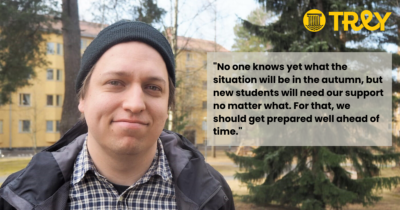The first pair of helping hands, the first familiar face and the first new contact on the phone. In August 2020, a large group of students arrive to the university campuses to do important work for new students: tutors.
The most important things in a tutor’s work are enthusiasm and openness towards other people. These will take you far, but sometimes we forget that tutoring is also part of the curriculum with its own expected learning outcomes and requirements. Raving over project management and presentation skills isn’t just empty words. Tutoring really does give you a chance to develop many important skills. When I first tutored in autumn 2012, I had to find out for the first time how important scheduling and organising work beforehand actually are. Up until then, I had pretty much managed my duties with vague, unorganised dabbling. Luckily, you don’t need to learn tutoring skills blindly because training is available for the position.
The state of emergency this spring has turned over the calendars and routines of every member of our community. This has also happened with the tutoring training. As the training sessions were cancelled, TREY and the university decided to highlight flexibility. The training material and lectures will be added to the Moodle platform, where tutors can visit them independently in their own time. A whole slew of new people, tools and working methods await new freshers at the university. For example, the deployment of the Sisu system is bound to be puzzling many people. For that and other reasons, tutors are advised to get acquainted with Sisu at least superficially through Moodle. Building up knowledge increases the confidence needed to support new students in their first steps as members of the university community.

Tutors will also get help from tutoring guides, which include useful information, tips on tutoring as well as support for the tutors’ own well-being and in how they perceive the scope of their work. But the most important tip that I think I can give tutors is this: Remember the boundaries of your role. You don’t need to have an answer to every question. The most important thing is willingness to help and search for information. Be active but don’t overburden yourself. Tutoring is supposed to be fun, both for you and your tutor group. A tutor’s work is independent and sometimes hectic, so remember to rest and get distance from the role.
The tutors of autumn 2020 are required to have flexibility, self-direction and motivation more than ever. I recommend all tutors to lean on your subject association’s other tutors, tutoring or fresher organisers and, if needed, on us in the student union throughout the spring and summer. No one knows yet what the situation will be in the autumn, but new students will need our support no matter what. For that, we should get prepared well ahead of time.